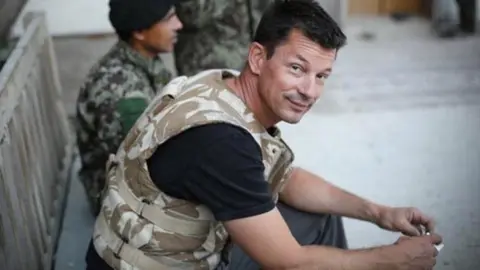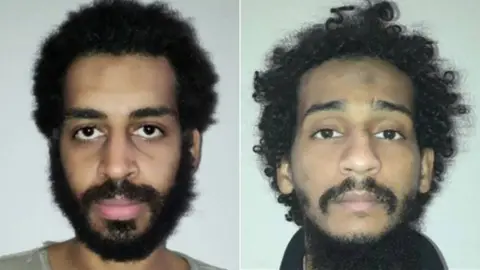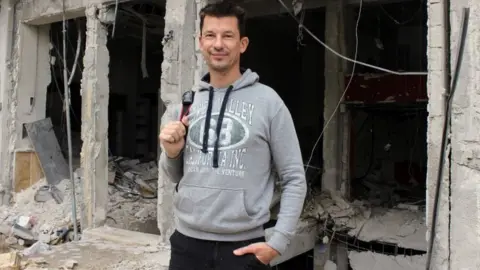Islamic State: Relatives of British hostage braced for coming trial
 BBC
BBCOn 22 November this year it will be exactly eight years since the British photojournalist John Cantlie was kidnapped by the Islamic State group (IS) in Syria, along with the American journalist James Foley.
Mr Foley was murdered by his captors. So too were the British and American aid workers and journalists David Haines, Steven Sotloff, Kayla Mueller, Peter Abdurrahman Kassig and Alan Henning.
Mr Cantlie's fate is still unknown. IS forced him to appear in its propaganda videos, criticising the West in what appeared to be scripted addresses to the camera. But he has not been seen since 2016.
Two of the alleged members of the gang dubbed "The Beatles", Alexanda Kotey and El Shafee Elsheikh, were captured in 2018. Since then, they have been in a legal limbo but recent developments in the US mean the way is now clear, in theory, for their trial to go ahead in the US.
For the first time, Mr Cantlie's sister Jessica Pocock has spoken publicly of her eight-year ordeal, telling the BBC of the enormous relief she and the other hostage families feel at finally getting their day in court.
"This" she tells me, "is the first really good thing to have come out of this whole situation".
"It's the best thing that could have happened for us," she says. "We've only ever wanted these two (Kotey and Elsheikh) to face justice."
 Reuters
ReutersShe goes on to describe the frustration the families felt as the legal wrangles stretched on for months. "It became more and more complicated and difficult and we felt, I think, at times, absolutely desperate as to whether the legal system was ever going to be able to bring these two to justice, wherever that might be."
Is she confidant that the men will get a fair trial in the US? "I have every confidence they will, yes. All the families of all the American and British people who were taken (hostage) all need nothing less than a fair trial."
'Unbelievably difficult'
For Jessica, the long wait for justice has been every bit as hard as it has for those whose loved ones were murdered by IS.
Mr Cantlie was kidnapped twice, escaping the first time from Syria and returning briefly to Britain. While he was back home the two siblings had a long conversation.
"He felt absolutely that he had to go back to Aleppo to tell the story," she says. "He hadn't managed to tell it when he was first kidnapped and he felt that it was his duty to go back."
Mr Cantlie's last known appearance was in an IS propaganda video from Mosul, where the group was using him in an attempt to convey the impression it was still in control, despite its mounting military setbacks.
For Jessica, it was particularly tough to see her brother in such circumstances. "It was surreal," she says. "It gave us a proof of life at that moment but then five minutes later it was no longer really valid.
"It felt unbelievably difficult to see somebody that you love so much on a screen and not be able to talk to them or engage with them, and not to know if you're ever going to see them for real again."
Mr Cantlie has not been seen since that video.
 Mustafa Karali
Mustafa KaraliMany of the other hostages were killed by their captors in 2014 when IS was at its most powerful.
Others were released in exchange for ransoms and they have spoken of a sadistic four-man gang of British jihadists who guarded them. They nicknamed them "The Beatles" because of their British accents.
Court battle
Their infamous ringleader was the former west Londoner Mohammed Emwazi, the black-masked man who appeared in IS beheading videos and known in the media as "Jihadi John".
He was killed in 2015 in Raqqa in a precision-guided US drone strike. Another gang member Aine Davis was arrested and imprisoned in Turkey.
The other two alleged members of the gang, Kotay and ElSheikh, remained at large until they were captured in 2018 by Syrian Kurds fighting IS.
The two former Londoners have admitted belonging to IS but have denied the UK and US governments' allegations of torture and murder.
America had wanted to put them on trial but was lacking crucial evidence gathered by British intelligence.
Earlier, the mother of one of the two suspects won her English court battle to prevent this evidence being transferred to the US on grounds of data protection.
The men have been in a legal limbo, held by the US military in Iraq where the US attorney general threatened to hand them over to the courts, renowned for their summary justice and executions.
Then came a breakthrough: America undertook not to carry out the death penalty if the men were convicted in a US court.
And finally, on Tuesday, England's High Court lifted the ban on evidence being passed to the US.
Counter-terrorism officers from the Metropolitan Police duly delivered that evidence in person to the US Embassy in London.
